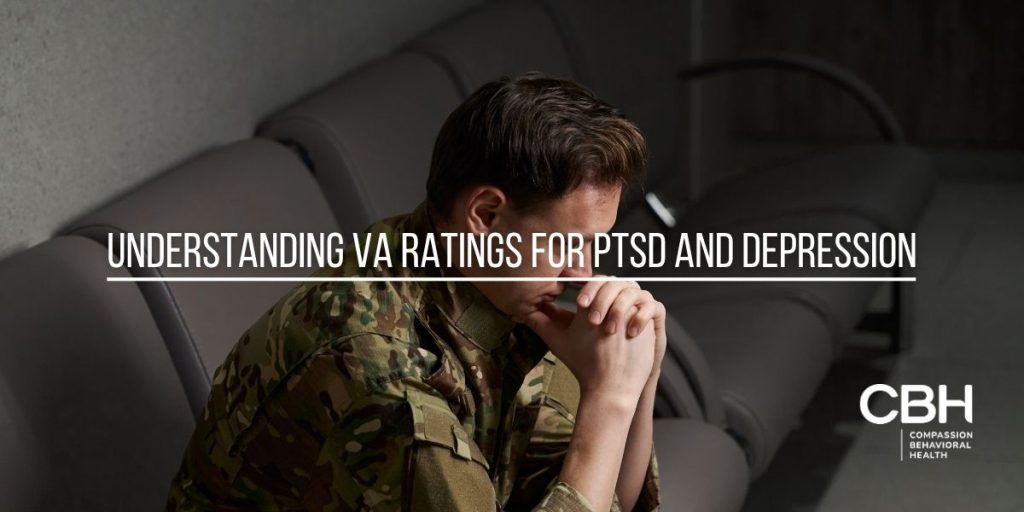In navigating the complex landscape of veterans’ benefits, one crucial aspect to understand is the system of VA ratings for post-traumatic stress disorder (PTSD) and depression. These ratings play a vital role in determining the level of compensation and healthcare benefits that veterans are entitled to receive. By delving into what these ratings entail and how they are determined, we can gain a deeper understanding of the impact they have on veterans’ well-being.
What are VA Ratings?
VA ratings serve as an objective measure of the severity of a veteran’s service-connected disabilities, such as PTSD and depression. They are expressed as percentages, ranging from 0% to 100% in increments of 10. The higher the rating, the more severe the disability and the greater the benefits.
The Purpose of VA Ratings
The primary purpose of VA ratings is to ensure that veterans receive compensation and healthcare benefits that reflect the impact of their disabilities on their daily lives. These ratings aim to offer financial support and access to necessary medical treatment to help veterans cope with the lasting effects of their service-related conditions.
How VA Ratings are Determined
VA ratings are based on a comprehensive evaluation process that takes into account various factors, including the medical evidence, service records, and interviews with the veteran. Medical professionals assess the severity of the symptoms and their impact on the veteran’s ability to function in different aspects of life.
During the evaluation, the veteran’s symptoms, such as recurring nightmares, anxiety, social withdrawal, or anhedonia, are documented. The frequency, intensity, and duration of these symptoms are carefully considered to determine the appropriate rating.
Additionally, the evaluation process may involve a review of the veteran’s medical history, including any previous diagnoses or treatments. This information helps provide a comprehensive understanding of the veteran’s condition and its impact on their daily life.
Furthermore, the evaluation may also include interviews with family members, friends, or colleagues who can provide insight into the veteran’s symptoms and their effect on their relationships and overall well-being. This collaborative approach ensures that the evaluation takes into account different perspectives and provides a holistic understanding of the veteran’s disability.
Moreover, the evaluation process may involve psychological testing or assessments to evaluate further the veteran’s cognitive functioning, emotional well-being, and overall mental health. These assessments help provide additional objective measures to support the determination of the VA rating.
It is important to note that VA ratings are not static and can be re-evaluated if there are changes in the veteran’s condition. Regular re-evaluations ensure that veterans continue to receive the appropriate level of benefits and support as their disabilities may improve or worsen over time.

Different Levels of VA Disability PTSD Ratings
The VA Disability PTSD Rating is categorized into several levels, each representing a different degree of impairment and level of compensation. These ratings are crucial in determining the benefits and resources available to veterans.
0% Rating and Its Implications
A 0% rating is assigned when a veteran is diagnosed with PTSD but does not meet the criteria for a higher rating. Although no monetary compensation is provided at this level, the veteran may still receive necessary healthcare at VA facilities and access resources such as support groups and counseling services.
30% Rating and Its Implications
A 30% rating indicates that the veteran experiences moderate symptoms of PTSD, resulting in impairment in social and occupational functioning. At this level, veterans receive monthly compensation and are eligible for additional benefits, such as vocational rehabilitation programs and assistance with obtaining employment.
50% Rating and Its Implications
A 50% rating is assigned when the veteran’s PTSD symptoms are severe and significantly impact their daily life and ability to work. At this level, veterans receive increased compensation and have access to comprehensive healthcare services through the VA. They may also be eligible for additional benefits, such as housing assistance and educational support.
70% Rating and Its Implications
A 70% rating indicates that the veteran’s PTSD symptoms are highly severe and result in substantial impairment in multiple areas of life. Veterans with this rating receive higher compensation, along with comprehensive healthcare benefits. They may also qualify for additional assistance, such as assistance with activities of daily living and caregiver support.
100% Rating and Its Implications
A 100% rating is assigned when the veteran’s PTSD symptoms are considered totally disabling, rendering them unable to work or engage in daily activities. At this level, veterans receive the highest compensation and access to extensive healthcare benefits. They may also qualify for other resources, such as vocational rehabilitation and home adaptations to accommodate their disabilities.
Understanding PTSD
Post-traumatic stress disorder (PTSD) is a mental health condition that can develop in individuals who have experienced or witnessed traumatic events. It is often accompanied by a range of distressing symptoms that can persist long after the traumatic incident.
Symptoms of PTSD
The symptoms of PTSD can manifest in a variety of ways, including intrusive thoughts, flashbacks, nightmares, hypervigilance, and emotional numbness. Avoidance of triggers or reminders of the traumatic event is also common, as is difficulty concentrating and disturbances in sleep patterns.
Individuals with PTSD may also experience emotional and physical symptoms, such as irritability, anger outbursts, and unexplained physical pain. These symptoms can significantly impact a veteran’s daily life and relationships.
How PTSD is Diagnosed
Diagnosing PTSD requires a comprehensive assessment by a qualified healthcare professional. They will carefully evaluate the veteran’s symptoms, taking into account the diagnostic criteria outlined in the Diagnostic and Statistical Manual of Mental Disorders (DSM-5).
The diagnosis of PTSD often involves a thorough review of the veteran’s experiences, including any traumatic events and the resulting symptoms. The healthcare professional will consider the duration and intensity of the symptoms, as well as their impact on the veteran’s ability to function in different areas of life.
Understanding Depression
Depression is a mood disorder characterized by persistent feelings of sadness, hopelessness, and a loss of interest in activities once enjoyed. It is a complex condition that affects both mental and physical well-being.
Symptoms of Depression
The symptoms of depression can vary from person to person, but common indicators include feelings of sadness, fatigue, changes in appetite and weight, sleep disturbances, and difficulty concentrating. Individuals with depression may also experience a lack of motivation and pleasure in activities, as well as thoughts of self-harm or suicide.
Depression can have a profound impact on all aspects of a veteran’s life, including relationships, work performance, and overall quality of life.
How Depression is Diagnosed
Diagnosing depression requires a thorough assessment by a healthcare professional. They will evaluate the veteran’s symptoms and consider the diagnostic criteria outlined in the DSM-5. The duration and intensity of symptoms, as well as their impact on daily functioning, are carefully considered.
Veterans need to seek professional help if they suspect they may be experiencing depression. Early diagnosis and intervention can significantly improve the prognosis and quality of life.
How the VA Rates PTSD and Depression
The rating process for PTSD and depression follows a similar structure that takes into account the severity and impact of these conditions on a veteran’s daily functioning.
The Rating Process for PTSD
When evaluating PTSD, the rating specialists consider the overall impact on the veteran’s social and occupational functioning. The severity of symptoms, such as the frequency and intensity of intrusive thoughts, nightmares, and hyperarousal, is carefully assessed. The impact of these symptoms on the veteran’s ability to work, maintain relationships, and engage in daily activities is also evaluated.
The Rating Process for Depression
Similarly, the rating process for depression considers the extent to which the veteran’s symptoms impact their ability to function in various areas of life. The intensity and duration of feelings of sadness, fatigue, and anhedonia are evaluated, as well as any impairment in social and occupational functioning.
The Impact of VA Ratings on Veterans’ Benefits
The VA ratings for PTSD and depression have a direct impact on the benefits and compensation that veterans are eligible to receive.
How VA Ratings Affect Compensation
Compensation for disabilities is based on the assigned rating percentage. The higher the rating, the greater the financial support received. These funds can help veterans cover the costs of medical treatment, therapy, and living expenses that may arise due to their service-connected conditions.
How VA Ratings Affect Health Care Benefits
VA ratings also determine the level of healthcare benefits veterans are entitled to receive. Higher ratings provide access to a more extensive range of medical services and treatments. This ensures that veterans receive the necessary care to manage and improve their health and well-being.
Understanding the VA ratings for PTSD and depression is essential for veterans navigating the benefits system. These ratings reflect the severity and impact of these conditions on veterans’ lives and determine the level of compensation and healthcare benefits they are eligible to receive. By providing an objective measure of disability, these ratings play a crucial role in supporting veterans’ well-being and helping them access the resources they need to lead fulfilling lives after their service.
Get the Help for PTSD and Depression Today
Compassion Behavioral Health located in Hollywood, Florida is dedicated to providing compassionate and comprehensive mental healthcare for veterans struggling with PTSD, depression, and co-occurring mental health issues. At our facility, we make it easy for you to get the care you need. We can accept VA benefits and insurance for our Innovative PTSD treatment so that you can focus on what matters most. If you or a loved one is a veteran in need of mental health care, please call us or contact us online for support today.



